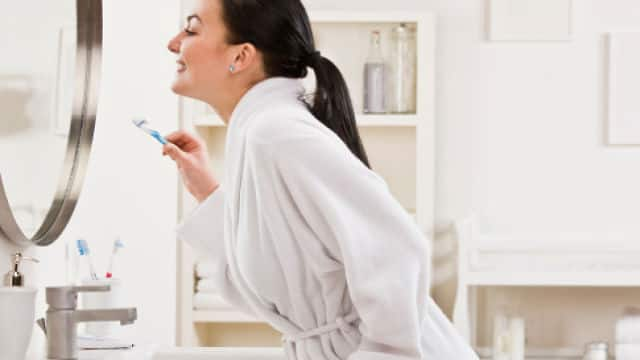-
-

ADULT ORTHODONTICS
Should You Use Mouthwash Before or After Brushing?Brushing and flossing are the foundation of a good oral hygiene routine, but mouthwash can also be a useful addition...

SELECTING DENTAL PRODUCTS
Soft Vs. Hard Toothbrush: Which One Should You Use?The toothbrush has come a long way. As the American Dental Association (ADA) notes...
-
Science & Innovation
- Oral Health and Dental Care | Colgate®
- Oral Health
- Is Brushing Teeth After Eating Good For You?


Certain foods and drinks - especially those high in carbohydrates and sugars - spur the creation of certain bacteria in your mouth that attack your tooth enamel for at least twenty minutes after you eat a meal or have a snack. By brushing right after you eat, you will get rid of bacteria before they attack your tooth enamel.
For the best results, you should use an ADA-accepted fluoride toothpaste like Colgate Total, which contains fluoride to prevent tooth decay and triclosan to reduce plaque and gingivitis. It works double duty - getting rid of plaque and preventing tooth decay - to ensure that your teeth stay squeaky clean after you eat.
You should know, however, that brushing your teeth after eating can sometimes affect your tooth enamel. According to the Mayo Clinic, if you've consumed anything acidic, you should avoid brushing your teeth for at least 30 minutes. Foods containing citric acid, like oranges, grapefruits and lemons, weaken tooth enamel. Brushing too soon after eating them can damage the enamel in its weakened state.
Consequently, it's a good idea to brush your teeth before eating an acidic food and to drink a glass of water when you are finished to wash away the acids. As an alternative to waiting to brush your teeth, try eating nutritious foods that are low in carbohydrates and sugar after eating something acidic. This will help reduce the harmful acids that such foods can create.
In addition, according to the American Dental Association, prolonged exposure to phosphoric acid, which can be found in soft drinks like soda and diet soda, can erode hard tissues from the tooth surface. Acid erosion causes permanent damage to your teeth. To keep acid erosion to a minimum, limit snacking between meals and be mindful of consumption of soft drinks and sugary snack foods.
Related Products

Helping dental professionals
More professionals across the world trust Colgate. Find resources, products, and information to give your patients a healthier future











